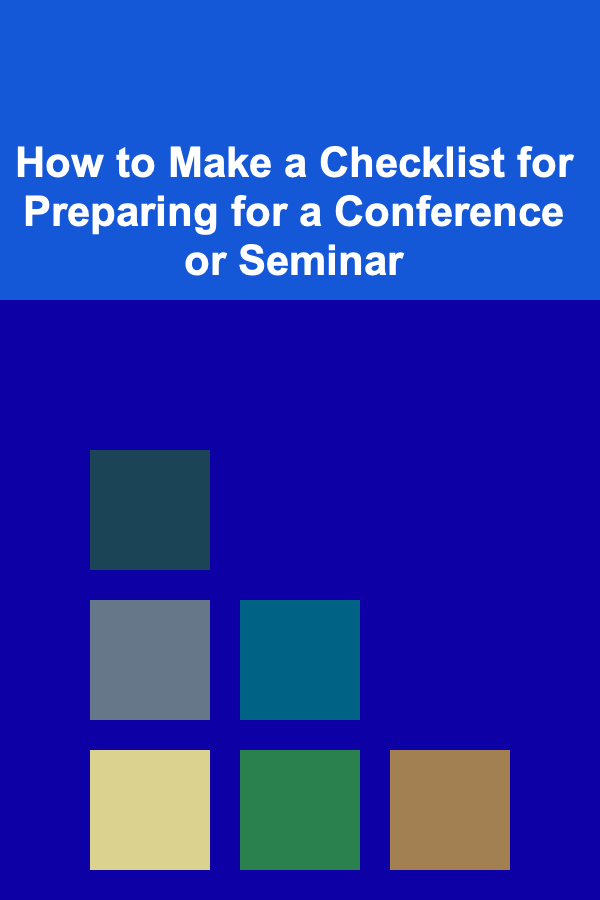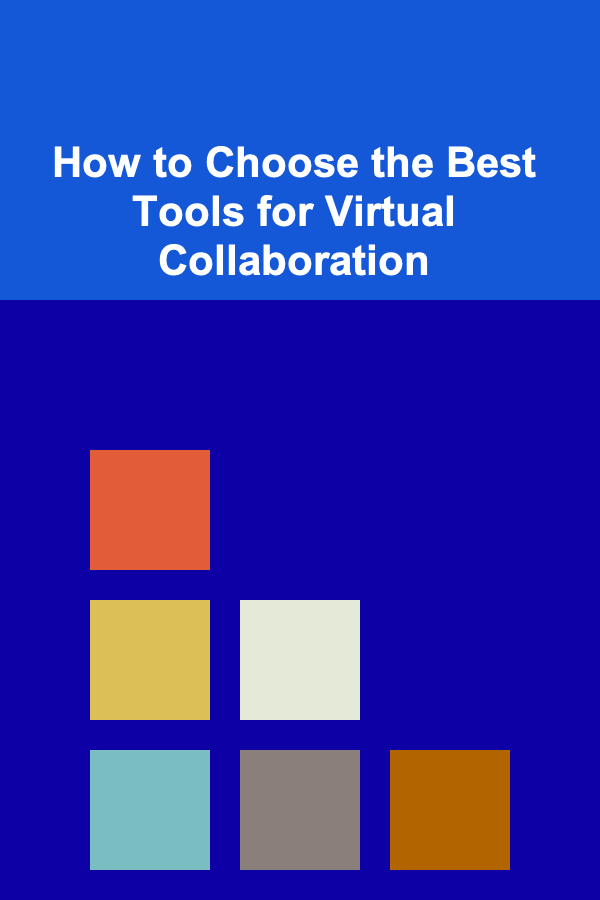
How to Make a Checklist for Preparing for a Conference or Seminar
ebook include PDF & Audio bundle (Micro Guide)
$12.99$10.99
Limited Time Offer! Order within the next:

Attending a conference or seminar can be an incredibly rewarding experience, whether it's for professional development, networking, or learning about the latest trends in your field. However, in order to make the most out of such an event, preparation is key. Creating a detailed checklist can ensure that you are fully prepared and ready to take advantage of everything the conference or seminar has to offer.
In this guide, we'll break down how to create a thorough checklist to prepare for your next event, focusing on several important aspects like logistics, materials, and personal readiness.
Understand the Event Details
Before diving into preparations, the first step is to thoroughly understand the event. Knowing the schedule, venue, and purpose of the event will set the foundation for your checklist. Here's what you need to gather:
Event Overview
- Dates and Times: Note the start and end dates of the conference or seminar, as well as any specific time slots for keynote speakers, breakout sessions, or networking events.
- Location: Make sure you know the venue, including the exact address and, if necessary, room numbers for different sessions or events.
- Agenda: Familiarize yourself with the full agenda of the event, including the list of speakers, workshops, and sessions. Prioritize the sessions most relevant to your goals.
- Registration: Confirm your registration status. If you haven't registered, make sure to complete that as soon as possible to avoid last-minute issues.
Pro Tip:
Check if the event provides a mobile app or online portal to track live updates, schedule changes, and speaker info. These tools often offer better navigation during the event.
Logistics and Travel Arrangements
Once you've clarified the event details, the next step is to tackle the logistical aspects of attending. Efficient planning will minimize stress and maximize the time you spend actually participating in the conference or seminar.
Travel Preparation
- Book Transportation: If you're traveling to a different city or country, arrange for transportation in advance (flights, trains, buses, or car rentals).
- Confirm Accommodation: Make sure your hotel or Airbnb booking is confirmed, and note the check-in/check-out times, especially if you're arriving late or leaving early.
- Travel Insurance: It's always a good idea to have travel insurance in case of delays or cancellations.
Packing Essentials
- Conference Badge: Double-check that your registration includes a physical badge or digital ID for entry.
- Business Cards: Pack enough business cards to network with other attendees, speakers, or sponsors.
- Personal Identification: Always have a valid ID, passport (if traveling internationally), and any required visas ready.
- Luggage: Ensure you pack everything you need, especially if you're traveling for several days. Don't forget chargers, adapters (for international travel), and any documents needed for travel or entry to the event.
- Comfortable Clothing: While most conferences and seminars are business casual, you may want to check the dress code. Bring comfortable shoes for walking and any attire that fits the event's tone.
Prepare for the Sessions
The primary reason you're attending a conference or seminar is to learn, so it's essential to prepare for the sessions you plan to attend. This will help you maximize your knowledge intake and keep you engaged throughout the event.
Session Selection
- Review the Agenda: Revisit the conference or seminar agenda and select the sessions that align with your professional goals. Mark them on your calendar, and take note of session locations.
- Plan Your Breaks: Schedule downtime between sessions to prevent burnout. These breaks can also be used for networking, checking in with colleagues, or visiting the exhibitor booths.
- Prepare Questions: After reading session descriptions or reviewing speakers' bios, jot down any questions you have that you would like to ask during Q&A sessions. This will show engagement and deepen your understanding.
Pre-Event Learning
- Research Speakers: Look up the speakers' backgrounds and work so you can ask informed questions and engage in meaningful discussions.
- Prepare Materials for Discussion: If you're part of any panel discussions or presentations, prepare your talking points, slides, or any materials you need to present.
- Review Key Topics: If there are key trends or concepts being discussed at the event, make sure you're up to speed on those topics. This might involve reading articles, papers, or blog posts.
Prepare Materials and Tools for the Event
To ensure you're fully prepared for the conference or seminar, gather all the necessary materials and tools you'll need.
Event Materials
- Notebook or Digital Device: Choose between bringing a notebook or your laptop/tablet. Many people prefer digital tools for note-taking, as they're easy to organize and share, but a notebook is perfect for quickly jotting down thoughts and insights.
- Event Program: Print a copy of the program or download the event app on your phone to refer to schedules and session details.
- Swag Bag: Many conferences give out promotional materials or gifts. It's a good idea to have an extra bag for carrying these items without overloading your primary bag.
Tech Tools
- Mobile Charging Devices: Pack portable chargers, charging cables, and adaptors for your phone and laptop. Some events may provide charging stations, but it's always better to be prepared.
- Apps for Note-taking: Consider apps like Evernote, OneNote, or Google Keep for efficient digital note-taking. Some apps even allow you to share notes with other attendees, which can be useful for collaboration or follow-ups.
- Business Networking Apps: Download apps like LinkedIn or other event-specific apps that may allow you to connect with other participants before, during, and after the event.
Networking Preparation
A significant part of any conference or seminar is the opportunity to network with like-minded professionals, potential partners, or industry leaders. Being prepared for networking will ensure you make meaningful connections during the event.
Networking Strategy
- Research Attendees: If the event offers a participant list, review it to see who you would like to connect with. This can help you approach specific individuals and make your conversations more purposeful.
- Prepare Your Pitch: Have an elevator pitch ready---a concise, 30-second introduction about who you are and what you do. This is essential for first impressions.
- Set Goals: Determine what you hope to accomplish during the event. Do you want to meet specific people? Learn about certain topics? Have a clear idea of what you want to gain from the networking opportunities.
Social Media Engagement
- Event Hashtag: Follow the event's social media hashtag to stay updated on real-time developments, connect with other attendees, and participate in online discussions.
- Share Your Experience: Document your experience by sharing photos, key takeaways, or interesting observations on your social media accounts. This helps build your professional profile and can lead to further networking opportunities.
Follow-Up After the Event
Your preparation doesn't end when the event is over. Following up is crucial to turning your conference or seminar experience into long-term value.
Post-Event Actions
- Reach Out to Contacts: Send LinkedIn connection requests or emails to the people you met. Reference something specific from your conversation to jog their memory.
- Review Your Notes: Within 24 hours, go over the notes you took during the event. If you used digital tools, organize them into useful categories for future reference.
- Apply What You Learned: Share the insights you gained with your team or apply new knowledge in your work. Consider writing a blog post or giving a presentation to communicate key takeaways.
Reflection
- Evaluate Your Experience: Take a moment to reflect on how the event went. What did you learn? Did you meet your goals? What could you do better next time?
- Prepare for the Next Event: Conferences and seminars are recurring opportunities, so use your experience as a learning tool for preparing for future events.
Conclusion
By creating a detailed checklist and following through with preparation, you can ensure that you make the most of any conference or seminar you attend. Whether it's for personal growth, professional development, or expanding your network, the key is thorough planning. From understanding event details to networking effectively, each part of the preparation process plays a crucial role in making the event a success.
Reading More From Our Other Websites
- [Home Budget Decorating 101] How to Use Minimalist Decor to Save Money and Style Your Home
- [Reading Habit Tip 101] Speed Reading for Professionals: Boosting Productivity in the Digital Age
- [Organization Tip 101] How to Replace a Toilet Flapper: A Simple Step-by-Step Guide
- [Personal Investment 101] How to Choose Between Active and Passive Investment Funds
- [Home Storage Solution 101] How to Organize Your Home with Smart Closet Systems
- [Home Cleaning 101] How to Declutter Before You Clean: A Step-by-Step Guide
- [Home Holiday Decoration 101] How to Incorporate Natural Elements into Your Holiday Decor
- [Personal Care Tips 101] How to Choose Hand Cream for Men's Skincare Needs
- [Ziplining Tip 101] Best Zipline Combine Packages With Rock Climbing and Canyoning in the Colorado Rockies
- [Organization Tip 101] How to Use Digital Tools for Home Maintenance Management

How to Choose the Best Tools for Virtual Collaboration
Read More
How to Get a High-End Look Using Budget Furniture
Read More
How to Keep Your Meal Prep Process Stress-Free
Read More
How to Plan a Memorable Party for Special Occasions
Read More
How to Share Your Hobby Collection Online While Staying Organized
Read More
10 First Aid Kit Must-Haves for New Parents
Read MoreOther Products

How to Choose the Best Tools for Virtual Collaboration
Read More
How to Get a High-End Look Using Budget Furniture
Read More
How to Keep Your Meal Prep Process Stress-Free
Read More
How to Plan a Memorable Party for Special Occasions
Read More
How to Share Your Hobby Collection Online While Staying Organized
Read More